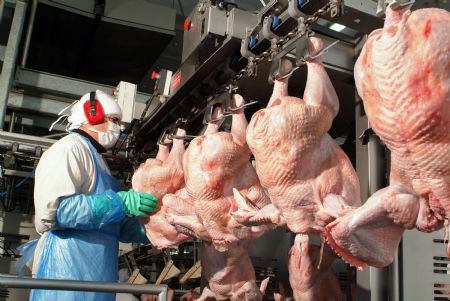The detection of an H1N1 virus in turkeys in Chile raises concern that poultry farms elsewhere in the world could also become infected with the pandemic flu virus currently circulating in humans, the Food and Agriculture Organization (FAO) of the United Nations said on Thursday.
The FAO said the Chilean authorities reported last week that the new H1N1 virus was present in turkeys in two farms near the seaport of Valparaiso.
The flu strain found in the poultry flocks is identical to the A/H1N1 pandemic strain currently circulating among human populations around the world, the Rome-based UN agency said.
|

|
|
Handout image shows a worker processing turkeys a turkey plant in La Calera city, about 125 km (78 miles) south of Santiago, August 21, 2009. The outbreak of the H1N1 flu virus among turkeys in Chile should not be a cause for alarm as animal cases remain minor compared to the pandemic facing humans, the World Organisation for Animal Health said on Friday. [Xinhua/Reuters] |
However, the FAO said the discovery of the virus in turkeys does not pose any immediate threat to human health and turkey meat can still be sold commercially following veterinary inspection and hygienic processing.
"The reaction of the Chilean authorities to the discovery of H1N1 in turkeys -- namely prompt reporting to international organizations, establishing a temporary quarantine, and the decision to allow infected birds to recover rather than culling them -- is scientifically sound," said the FAO's interim Chief Veterinary Officer Juan Lubroth.
"Once the sick birds have recovered, safe production and processing can continue. They do not pose a threat to the food chain," said Lubroth.
The current H1N1 virus strain is a mixture of human, pig and bird genes and has proved to be very contagious but no more deadly than common seasonal flu viruses. However, it could theoretically become more dangerous if it adds virulence by combining with H5N1, commonly known as avian flu, which is far more deadly but harder to pass along among humans, the UN agency explained.
"Chile does not have H5N1 flu. In South-East Asia where there is a lot of the virus circulating in poultry, the introduction of H1N1 in these populations would be of a greater concern," said Lubroth.
The FAO also urges governments to enhance monitoring of health among animals and to ensure that hygienic and good farming practice guidelines are followed, including protecting farm workers if animals are sick and not allowing sick workers near animals.
"We must monitor the situation in animals more closely and strengthen veterinary services in poor and in-transition countries. They need adequate diagnostic capability and competent and suitably resourced field teams that can respond to emergency needs," Lubroth said.
(Xinhua News Agency August 28, 2009)